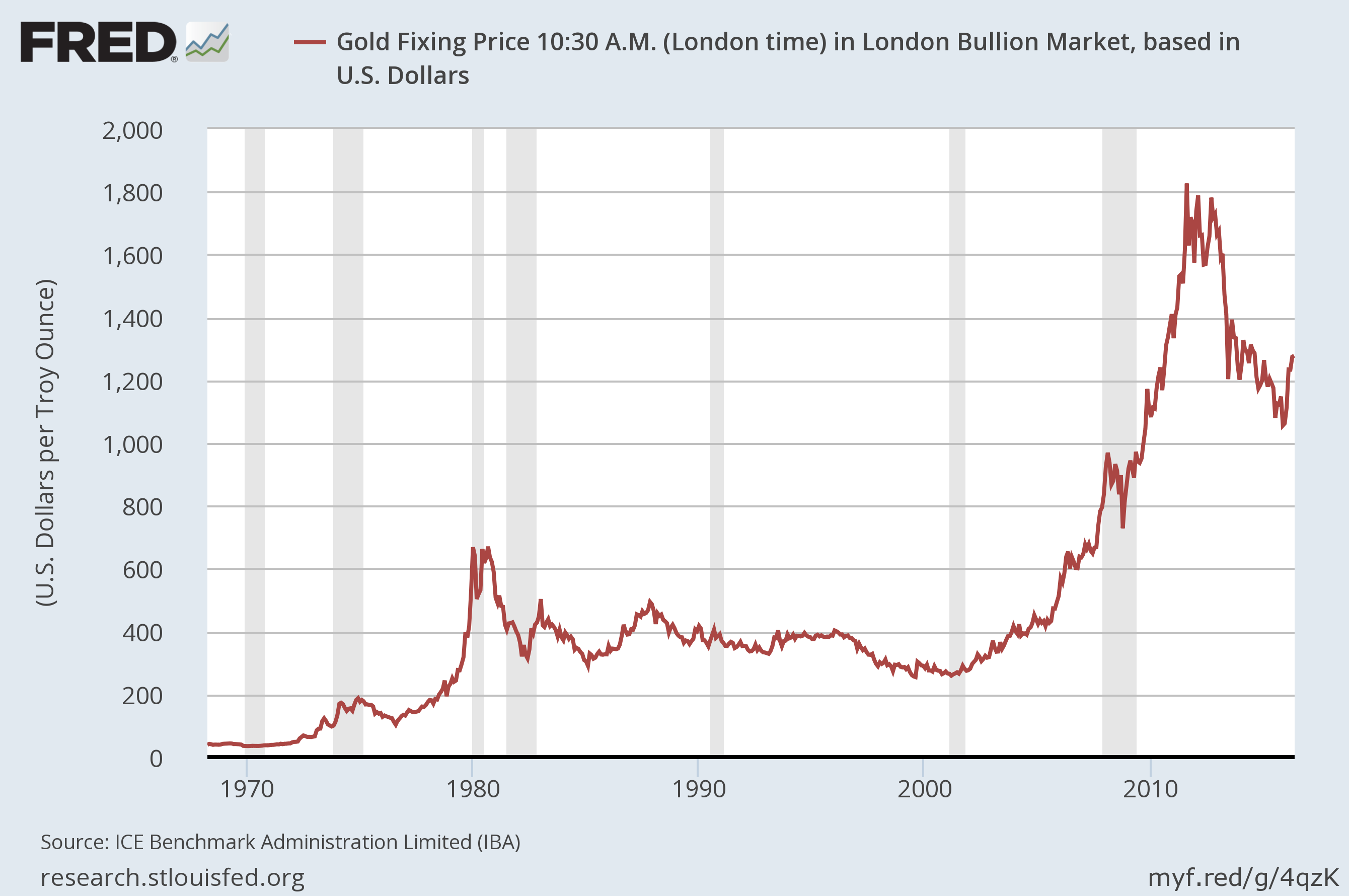Thinking About Buying Gold? Think Again
The precious metal makes for a nice anniversary present, but it's not a good investment.

Profit and prosper with the best of Kiplinger's advice on investing, taxes, retirement, personal finance and much more. Delivered daily. Enter your email in the box and click Sign Me Up.
You are now subscribed
Your newsletter sign-up was successful
Want to add more newsletters?

Delivered daily
Kiplinger Today
Profit and prosper with the best of Kiplinger's advice on investing, taxes, retirement, personal finance and much more delivered daily. Smart money moves start here.

Sent five days a week
Kiplinger A Step Ahead
Get practical help to make better financial decisions in your everyday life, from spending to savings on top deals.

Delivered daily
Kiplinger Closing Bell
Get today's biggest financial and investing headlines delivered to your inbox every day the U.S. stock market is open.

Sent twice a week
Kiplinger Adviser Intel
Financial pros across the country share best practices and fresh tactics to preserve and grow your wealth.

Delivered weekly
Kiplinger Tax Tips
Trim your federal and state tax bills with practical tax-planning and tax-cutting strategies.

Sent twice a week
Kiplinger Retirement Tips
Your twice-a-week guide to planning and enjoying a financially secure and richly rewarding retirement

Sent bimonthly.
Kiplinger Adviser Angle
Insights for advisers, wealth managers and other financial professionals.

Sent twice a week
Kiplinger Investing Weekly
Your twice-a-week roundup of promising stocks, funds, companies and industries you should consider, ones you should avoid, and why.

Sent weekly for six weeks
Kiplinger Invest for Retirement
Your step-by-step six-part series on how to invest for retirement, from devising a successful strategy to exactly which investments to choose.
It's been a typical spring. The stock market has been gyrating (sell in May and go away), a contentious election cycle is just heating up, Europe is still a mess, and then there is the Middle East. And just like mosquitoes, the gold bugs are out in full force.
"Avoid being a victim of the next crisis, and protect yourself with gold," the gold bugs love to say. Because as the "only" store of true value, owning gold is the best way to protect yourself from the ravages of the next crisis, right?
Not so fast. The world is full of worries; same as it ever was. I'm not so sure that we are in any bigger or more imminent danger than we always seem to be in. Even if the next financial/economic/energy/global unrest crisis is inevitable, it is no more imminent today than it was 10 years ago. The world only seems scarier.
From just $107.88 $24.99 for Kiplinger Personal Finance
Become a smarter, better informed investor. Subscribe from just $107.88 $24.99, plus get up to 4 Special Issues

Sign up for Kiplinger’s Free Newsletters
Profit and prosper with the best of expert advice on investing, taxes, retirement, personal finance and more - straight to your e-mail.
Profit and prosper with the best of expert advice - straight to your e-mail.
But with the concession that some formidable crisis is inevitable, what it the best way to prepare?
Investing is about comparative value. You have X dollars to invest. What alternatives bring the most value? Let's test gold. Is the glittery stuff really the best hedge against a crisis?
For this comparison, let's assume that you can buy all the gold in the world, versus something else. Warren Buffett offered a similar analysis in his 2011 annual letter to shareholders. At that time, he calculated that all the gold ever mined from the earth (currently about 171,000 tonnes) if melted together would form a cube that would roughly fit inside a baseball diamond. And it could all be yours for just $6.577 trillion! Tempting.
But consider some alternatives. Instead, let's say money was no object, and you could buy (as in the entire company): Amgen Inc (symbol AMGN), Merck (MRK), Procter & Gamble (PG) and Johnson & Johnson (JNJ). Why? Because no matter what crisis we may face, we will all still want medicine, toothpaste, diapers and toilet paper.
And why stop there? How about Verizon (VZ) and Apple (AAPL) because smartphone texting and tweeting will always be something to do; General Electric (GE) and Exxon Mobil (XOM) because oil is oil and big machines need oil to run; Microsoft (MSFT), Berkshire Hathaway (BRK.A) and International Business Machines (IBM) because who wouldn't want Bill Gates, Warren Buffett and Watson (IBM's artificial intelligence) working for them?; Amazon (AMZN) because people will always be buying stuff; Wells Fargo & Co. (WFC) because the guy that bought the giant gold cube will need to monetize it somehow; and Anheuser-Busch Inbev (BUD) because… well, if we truly face Armageddon, we'll all need a beer!
Okay; you might not be impressed and still opt for the gold. But here's my point. Based on their most recent dividend payments, if you owned each of these companies, they would be yielding an extra $97.643 billion per year in dividends! Your gold cube? It just sits there, doing nothing. It doesn't pay dividends, and it doesn't provide any real value (no beer, no toilet paper). That is called opportunity cost. By buying the gold cube, you forgo the opportunity to collect $97 billion a year between now and Armageddon.
Still not convinced which way to go? In addition to owning those fine companies, let's say you would have enough money left over to also buy about 385 million acres of farm land. If we faced a true global catastrophe, you could provide the world with 150 bushels of corn and 40 bushels of soy beans per acre per year. If things were to go really wrong, I'm thinking the dude with the gold cube would deliver it to you for just a few thousand of those acres.
What's this mean to someone without $6.577 trillion to invest, but maybe wants to put 10% or so of their savings into gold bars and coins? It's this: Gold comes with a huge opportunity cost. It sits there—sometimes for very long periods of time without doing anything. Gold hit $400 an ounce in November of 1979. It didn't cross the $400 threshhold and stay higher until August 2004. That's 25 years of lost opportunity and missed dividends. Sure, gold more than tripled in value from 2004 through 2011. But then, it dropped 40% until a recent bottom in November of last year. (It's now trading around $1,300.) Gold has hardly been a "store of value" over the years.

That's not to say gold is never a valid investment. But as a strategy, blindly buying and holding the metal doesn't make any more sense than blindly buying and holding any investment. Gold sellers will argue against buying paper gold such as the stocks of gold miners or an ETF such as GLD that buys actual gold to back its shares. You need the real stuff, they argue. But paper gold has one real advantage—it's very liquid. If we do have another financial crisis that drives the price of gold back to or above $1,800 an ounce, with GLD shares you can sell before suffering the subsequent post crisis drop.
Gold mining companies, such has Newmont Mining (NEM), benefit exponentially from an increase in the price of gold. Costs are fixed, so every incremental change in the price of bullion drops directly to the miners' bottom line. Shares of NEM have roughly doubled this year.
In other words, gold is a trade. Perhaps a nice wedding or anniversary present. It's not an investment.
Disclaimer: 401 Advisor, LLC is long the gold ETF (GLD) in our growth portfolios.
Bill DeShurko started in the financial services industry in 1987. He is the owner of 401 Advisor, LLC, a Registered Investment Advisor.
Profit and prosper with the best of Kiplinger's advice on investing, taxes, retirement, personal finance and much more. Delivered daily. Enter your email in the box and click Sign Me Up.

Bill DeShurko started in the financial services industry in 1987 and formed his own practice in 1994. He is the owner of 401 Advisor, LLC a Registered Investment Advisor located in Centerville, Ohio. After following fads, phases, and products of the day for nearly 30 years he hopes that his insights and experience can help today's investors navigate the financial markets.
-
 Ask the Tax Editor: Federal Income Tax Deductions
Ask the Tax Editor: Federal Income Tax DeductionsAsk the Editor In this week's Ask the Editor Q&A, Joy Taylor answers questions on federal income tax deductions
-
 States With No-Fault Car Insurance Laws (and How No-Fault Car Insurance Works)
States With No-Fault Car Insurance Laws (and How No-Fault Car Insurance Works)A breakdown of the confusing rules around no-fault car insurance in every state where it exists.
-
 7 Frugal Habits to Keep Even When You're Rich
7 Frugal Habits to Keep Even When You're RichSome frugal habits are worth it, no matter what tax bracket you're in.
-
 For the 2% Club, the Guardrails Approach and the 4% Rule Do Not Work: Here's What Works Instead
For the 2% Club, the Guardrails Approach and the 4% Rule Do Not Work: Here's What Works InsteadFor retirees with a pension, traditional withdrawal rules could be too restrictive. You need a tailored income plan that is much more flexible and realistic.
-
 Retiring Next Year? Now Is the Time to Start Designing What Your Retirement Will Look Like
Retiring Next Year? Now Is the Time to Start Designing What Your Retirement Will Look LikeThis is when you should be shifting your focus from growing your portfolio to designing an income and tax strategy that aligns your resources with your purpose.
-
 I'm a Financial Planner: This Layered Approach for Your Retirement Money Can Help Lower Your Stress
I'm a Financial Planner: This Layered Approach for Your Retirement Money Can Help Lower Your StressTo be confident about retirement, consider building a safety net by dividing assets into distinct layers and establishing a regular review process. Here's how.
-
 The 4 Estate Planning Documents Every High-Net-Worth Family Needs (Not Just a Will)
The 4 Estate Planning Documents Every High-Net-Worth Family Needs (Not Just a Will)The key to successful estate planning for HNW families isn't just drafting these four documents, but ensuring they're current and immediately accessible.
-
 Love and Legacy: What Couples Rarely Talk About (But Should)
Love and Legacy: What Couples Rarely Talk About (But Should)Couples who talk openly about finances, including estate planning, are more likely to head into retirement joyfully. How can you get the conversation going?
-
 How to Get the Fair Value for Your Shares When You Are in the Minority Vote on a Sale of Substantially All Corporate Assets
How to Get the Fair Value for Your Shares When You Are in the Minority Vote on a Sale of Substantially All Corporate AssetsWhen a sale of substantially all corporate assets is approved by majority vote, shareholders on the losing side of the vote should understand their rights.
-
 How to Add a Pet Trust to Your Estate Plan: Don't Leave Your Best Friend to Chance
How to Add a Pet Trust to Your Estate Plan: Don't Leave Your Best Friend to ChanceAdding a pet trust to your estate plan can ensure your pets are properly looked after when you're no longer able to care for them. This is how to go about it.
-
 Want to Avoid Leaving Chaos in Your Wake? Don't Leave Behind an Outdated Estate Plan
Want to Avoid Leaving Chaos in Your Wake? Don't Leave Behind an Outdated Estate PlanAn outdated or incomplete estate plan could cause confusion for those handling your affairs at a difficult time. This guide highlights what to update and when.